- From Faith Current: “The Sacred Ordinary: St. Peter’s Church Hall” - May 1, 2023
- A brief (?) hiatus - April 22, 2023
- Something Happened - March 6, 2023

Buckley: not merely awful
Scott Galupo over at The American Conservative has posted an article sure to raise the ire of normally oh-so-placid HD readers: “Understanding Fuddy-Duddy Beatle Haters.” The occasion is, of course, the 50th anniversary silliness…and, perhaps, a sneaky attempt to rehabilitate William F. Buckley. To quote Jeffery Lebowski, “This aggression shall not stand, man.”
“The crowned heads of anti-music”
If you read what Buckley wrote in The Boston Globe in September 1964, you can be forgiven for thinking, “Surely he wasn’t on cocaine?” It’s that over-the-top.
An estimable critic writing for National Review [Buckley’s magazine], after seeing Presley writhe his way through one of Ed Sullivan’s shows … suggested that future entertainers would have to wrestle with live octopuses in order to entertain a mass American audience. The Beatles don’t in fact do this, but how one wishes they did! And how this one wishes the octopus would win….
The Beatles are not merely awful; I would consider it sacrilegious to say anything less than that they are god awful. They are so unbelievably horrible, so appallingly unmusical, so dogmatically insensitive to the magic of the art that they qualify as crowned heads of anti-music, even as the imposter popes went down in history as “anti-popes.”
That first paragraph is standard issue Buckley, what a fundamentally unfunny person thinks a funny person sounds like. But the second? There’s being wrong, and then there’s being crazy. That it was a common, high-functioning kind of crazy, then and now, doesn’t make it any less worrisome.
There’s no need to look very deeply at Buckley’s public slamming of the Fabs—he always knew an enemy when he saw one. Buckley considered John, Paul, George and Ringo as antithetical to what he was fighting for, the thin end of some kind of wedge, and he was so, so right. But 50 years later, when the Beatles are the cultural equivalent of Christmas morning, that raises an uncomfortable question: if Buckley was so hysterically out-of-step about the Beatles, might his whole weltanschauung be fekockte? When Bill Buckley looked at the Beatles and saw “anti-Popes” (an especially pungent phrase for a devout Catholic), we’re entering General Jack D. Ripper territory. But one thing conservatives do really well is protect their household gods. If William F. Buckley, Barry Goldwater, or Ronald Reagan was revealed to have never brushed his teeth, you can bet there would be a think-tank founded to laud the benefits of gingivitis…
…In the most reasonable-sounding way, of course.
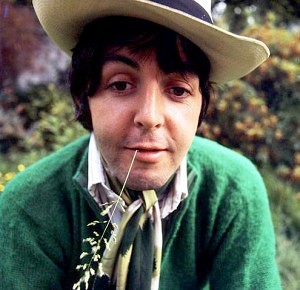
McCartney, retrogressing
“Without appearing willfully contrarian,” Scott Galupo writes, “I get where these critics were coming from, if only in a roundabout sort of way. I’m an enthusiast of early rock and all its British exponents, from both London and Liverpool; I appreciate and admire the Beatles just fine; etc. Yet at the end of the day I’m a Stones guy—and I can’t help but bristle when Beatlemaniacs diminish the Stones for their comparative lack of technical sophistication or proficiency. There is no end to my puzzlement at those who swear by the Beatles because of their proto-progressivity. Because here’s the thing: rock-and-roll really was retrogressive. Yes, even the Beatles.”
And with “proto-progressivity,” a bit of gelid gobbeldygook, we’ve entered a world where “progress” in popular culture is equal to, not wide acclaim or enjoyment, that’s far too sweaty a standard, or influence or durability, but—of all things—technical difficulty! Which has been shown exactly never, in 30,000 years. People react to the words or the sounds or the images, not the craft; that’s why you always, in popular art, hide the craft. Yet I’m sure the poor sap daubing a cave in Lascaux had somebody standing over him, criticizing his brushwork.
Galupo’s argument, which we’ve all heard before, is that The Beatles weren’t very good at their instruments (Paul McCartney might like to have a few words with him), especially compared to the great jazz virtuosi whom rock eclipsed in the popular imagination. I don’t know who Galupo’s hanging out with, but I know lots of Beatles fans and never once have I heard someone mention George Harrison’s “sweet jazz-guitar technique.” (Knowing George, he probably picked it up, painstakingly, from Bert Weedon.)
Technical proficiency has little to do with meaningful artistic work, much less creative genius, and the only people who haven’t gotten the memo are—I say this gently—snobs. Today music snobs can harken back to jazz geniuses as “those guys who could really play”; in Buckley’s day it was Beethoven and the other dead, white males. Which is why, after the Beatles didn’t fade away in six months, and the great LPs stacked atop one another, each slightly different than the last, the snob fallback position became: Thank goodness those ill-educated, non-music-reading Beatles had “classically trained” George Martin to help them out! (This type of thinking used to drive them crazy; it’s the source of John Lennon’s outburst in Lennon Remembers: “I’d like to hear George Martin’s music, please, just play me some.”) And once you head for “man behind the curtain territory,” you’re lost. One day it’s George Martin pulling the strings, the next it’s the Tavistock Institute.
Back in my day, popular art wasn’t so…popular
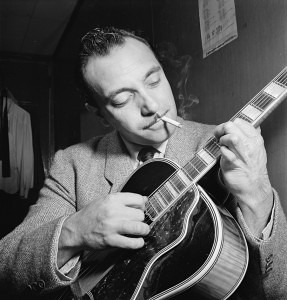
Leave Django out of it, he’s suffered enough
Let’s be honest: even if The Beatles could’ve dashed off a great two guitar, bass, and drums version of “Blue Rondo ala Turk” in perfect 9/8, this isn’t about that and never was. And that’s why my issue is with Buckley, and not Galupo. I have known a lot of people from Buckley’s precise time and place—prep-educated, moneyed Yalies from the late 40s-early 50s—and where they stood on things like the Beatles was as good a litmus test as I ever came up with. My friend Dick Lemon (Class of ’52; Buckley was ’50) told a story about being a reporter at Newsweek, and having to go interview the Beatles at the Plaza Hotel in February, 1964.
At first Dick was puzzled. “Why? They’re just a teenybopper thing.”
“Because they’re everywhere,” his editor replied.
“So’s dandruff!”
But Dick was a good soldier, so he trooped off to the Plaza—and was instantly charmed. Dick liked Beatle music fine, and what’s more, wasn’t threatened by what they stood for, and he was precisely the type of guy Galupo’s talking about—he loved Dixieland, and Fats Waller. But unlike all those other guys, Dick was smart enough, and culturally flexible enough, to see the Beatles for what they were. Buckley saw them only in the context of his obsessions.
The real talent of people like Buckley isn’t thinking, or political solutions—it’s replicating their views. Buckley was a master of the homemade bullhorn, in the National Review, for example, or “Firing Line.” At Yale, following the success of Buckley’s undergraduate jeremiad God and Man at Yale, there came to be a student political party called the POR. Back in my day, the Party of the Right was a clutch of affable bowtie-clad prepsters—precisely my type of freak, or one type, anyway. They liked old stuff, and England, and Greeks and Romans, as I do; you wouldn’t know it to look at me today, but throw me into a pile of tweed jackets, and I am thoroughly at home. But the occasion of all the POR’s Latinate bonhomie was (I recall this from my undergrad days) spending a drunken evening deciding whether it’s just to tattoo AIDS patients on the forehead—or perhaps the buttocks, if you’re a gay man—so nobody will have sex with them.
That’s the thing about Buckley: There was always something incredibly undergraduate about him. Impatient with the complexity that flummoxes mere mortals, he never allowed his thoughts to mature past those of a precocious 20-year-old. That’s what makes him attractive to a certain sort of person, then and now, but in reality it’s a sad fate, being an eternal Chairman of the Yalie Daily. You want to make things better—but have a mind so inflexible it can’t come up with useful solutions. Like a kid, in a world ruled by capital Buckley honestly thought that his conservatism was somehow radical or defiant; like a kid, he usually seemed unable to imagine being someone else; like a kid, he claimed as owed a massive number of unearned opportunities; and like a kid, he frequently disappeared into what he felt was “logic” or “intellectual rigor,” which inevitably reduced reality to brutal dicta. It’s all incredibly self-aggrandizing and sloppy. Buckley’s positions begin flawed, because they don’t proceed from the worthiness and preciousness of all life, especially life you don’t approve of, or understand (which is the same thing). William F. Buckley’s talent was in being certain, not wise.
You see this certainty and simplicity in every hard-right critique of the Beatles. Buckley never fulminated, that was infra-dig, but Devin pointed me to this quote by one Dr. Joseph Crow, “America’s number one authority on musical subversion:
Some of the newer Beatles songs [this is 1968-69] … show an acute awareness of the principles of rhythm and brainwashing. Neither Lennon nor McCartney were world-beaters in school, nor have they had technical training in music. For them to have written some of their songs is like someone who had not had physics or math inventing the A-bomb … Because of its technical excellence it is possible that this music is put together by behavioral scientists in some “think tank” … I have no idea whether the Beatles know what they are doing or whether they are being used by some enormously sophisticated people, but it really doesn’t make any difference. It’s results that count, and the Beatles are the leading pied pipers creating promiscuity, an epidemic of drugs, youth class-consciousness, and an atmosphere for social revolution.
The men behind the curtain
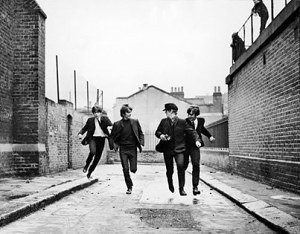
Four hoodlums, probably running from the scene of some crime
In 1964, there was a type of person who looked at John, Paul, George and Ringo and thought, “People who look like that, from that background, can’t possibly produce what they’ve produced. There must be a Svengali in there somewhere.” Brian with the suits; George Martin with the producing, Capitol manufacturing Beatlemania—they saw everything but what it actually was. This instinct, which a lot of people had in ’64 but Buckley never let go of, is pure snobbery. That he apparently never got over it, shows just how weak his vaunted intellectual curiosity really was in practice. I can tell you without any fear of contradiction that if The Beatles had started out as a singing group at Yale, Buckley wouldn’t have been calling them “anti-Popes.” And I’m all for pointing out the role of the supporting cast in The Beatles’ story—Epstein and Martin were both hugely important—but let’s also point out the nasty undertone of Pecksniffian snobbery—a “people like that oughtn’t be allowed”—which runs through Buckleyite conservatism like a vomit-stained POR tie. That’s what Galupo’s ignoring, and while I see why he’s ignoring it, it’s the crux of his topic.
With fans like this guy…
“Again, don’t misunderstand: I’m a Beatles fan,” says Galupo. “I appreciate the unparalleled pop-cultural phenomenon that they were. [Like Cabbage Patch Kids, not like Mozart.—MG] But if I squint just a little, I find it easy to put myself in the shoes of someone who’d lived through hot jazz and hard bop, and who found the Beatles to be amateurish lightweights.”
Come on now, my guitar-wielding friend: hardline cultural resistance to the Beatles, especially in 1964, and especially by Buckley, wasn’t just about, or even mainly about, comparing them to “hot jazz and hard bop” and finding them technically wanting. If it had been, long hair wouldn’t have come up; nor their “irreverence”; nor the constant questions of “how much money do you have, boys?” The issue was, in Buckley’s case, people not dressing or acting right, about disrespecting authority, about four mouthy knuckleheads from Liverpool not having earned the cultural signifiers that Buckley demanded to respect their success. To paraphrase Lennon again: “You can dislike us, just don’t deny us.”
Which brings us to “amateurish lightweights.” Well. The Beatles in 1964 were, by some measures, the most professional band in the world; the stage time they’d racked up was ungodly, and this showed in every performance. During the CBS show Sunday, Paul and Ringo talked about being able to hear NOTHING on stage, and keeping together perfectly by watching the others’ body language. That strikes me as almost unimaginably tight. By any reasonable standard, the Beatles of 1964 were neither amateurs nor lightweights, and if you can drop in “sweet jazz-guitar technique” with a straight face, you’re enough of a musician to know that, and call bullshit on it.
A floorwax AND a dessert-topping
“In my own shoes, I would defend the Beatles without denying this fact. The amateurishness of rock music was a feature, not a bug. And it still is. If your passion for the Beatles stems from this outsize opinion of their technical competence, I regret to inform you, you’re doing it wrong.”
And I regret to inform you that “Technical competence” is a silly standard for popular art, right? Right. But if one substitutes “musicality and range”—the kind of thing that Leonard Bernstein and others heard in the Beatles immediately—that’s another thing. The Beatles’ flummoxing musicality and range is what makes them more interesting (and to me more enjoyable) than, say, the Stones. A lot of (non-snobby) people’s biggest problem with the Beatles is precisely what made them extraordinary: they transcend category.
The Beatles were—and remain—genuinely subversive…
…in all the best senses of that word. I’ve always felt that some of the appeal of the Stones is how they reinforce the snob’s idea of the world: they’re scruffy-looking English guys playing scruffy music loudly, good for scruffy loud activities like drinking and boinking. (And the fact that Jagger was at LSE gratifies the snob no end—”Ahh, there’s the brains of the operation. I knew it was all a hustle.”) Jazz musicians also fit in the snob narrative: they’re underpaid, underappreciated savants (and servants) translating the Great American Songbook, written by slumming-prep Porter and showbiz Jew Gershwin. In the snob’s world, everybody’s reduced to their class, or religion, or race. The Beatles do not fit this narrative–they can rock, AND they can make music as durable as Porter or Gershwin. And yet none of them were discovered by any authority, nor could they even read music. This is what makes the Beatles profoundly subversive—a “Trojan horse,” as Lennon said—and the Stones not.
In Buckley’s world, true genius doesn’t come out of nowhere—breeding counts—so there must be something funny going on here. But of course there isn’t; the world never fit into the snob narrative, not today, and not in 1964. Buckley’s reaction was typical of a rigid mind confronted with A New Thing: fear and loathing. Today, we all realize that loathing the Beatles says much more about you than them—but of course it always did.



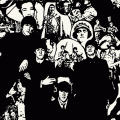


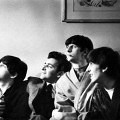

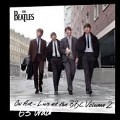
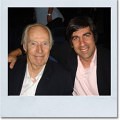
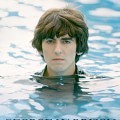
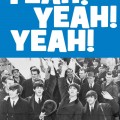

Yep, Buckley’s frothing-at-the-mouth denunciation of the Beatles exhibits a real terror of them, and for good reason. If four guys from Liverpool without college degrees or formal musical training could set off Beatlemania in the young, then there was a real threat to the social order Buckley represented (white guys of a certain pedigree, education, and income level). I think your analysis of the political dimensions of the distaste for the Beatles exhibited by Buckley and his heirs is right on the money. Plenty of nasty class assumptions there.
As for Galupo’s piece, the tone of it just sets my teeth on edge. “I regret to inform you, you’re doing it wrong.” The argument he is making about technical proficiency in music makes no sense to me at all. Technical proficiency is only important insofar as you have something worthwhile to say with it, and that’s where the Beatles excel. They created a songbook of astonishing range and consistently high quality AND performed it excellently. Blathering about “sweet jazz-guitar technique” is so beside the point it’s insane.
Glad you found it worth reading, Nancy. As you and Devin know, I had decided not to post it to avoid adding to the Festival of Bad Feelings that is the internet; but since I did, I’m glad it seemed insightful.
We can’t blame Galupo too much for his snotty tone–I have a feeling that’s S.O.P. over there. Now, they admire chamber music and long for Lester Lanin (http://www.youtube.com/watch?v=8q8GMbhtazs); in a century, they’ll long for the Beatles. It’s not about the music, it’s about being determined that things HAD TO be better in the old days. I have some of this myself, but in politics its pernicious nonsense.
I think what gets my goat most about Buckley is how he was apparently very nice in person; thoughtful, devout, cultured–a good sort of guy for his type. And his son, whom I know very slightly, is a fantastic satirist and true gent. But with WFB there was something broken in there. He could start out with a reasonable, even humane premise like “we should try to prevent the accidental transmission of HIV,” and end up talking about tattooing—and there was nothing strong enough in his make-up (not respect for civil rights, patriotic feeling for fellow citizens, religion, nor the ability to see himself in another) that made him stop and think: “Wait. That is a horrifically dehumanizing, medieval, totalitarian idea, bound to cause huge personal suffering and quite unlikely to work.”
A person cannot choose his/her era, and eras can work for good or ill on a person’s character. I think Buckley’s coming up at Yale in the early Cold War was very bad for his character. The right wing needed someone like him, and if it hadn’t been WFB, it might’ve been somebody even worse; but that doesn’t excuse his putting a palatable persona on a fundamentally uncompassionate (and certainly un-Christlike) worldview.
I have to admit, when William F. Buckley types dislike the Beatles , especially for the reasons they give and the threats they seemingly represent, it just makes me love them even more!
[WORDPRESS HASHCASH] The poster sent us ‘0 which is not a hashcash value.
Why would anyone pay attention to conservative panties-in-a-bunch Scott Galupo. When it comes to music, he don’t know s*** from apple butter. Keep in mind Buckley was at all times relevant hereto a fervent Catholic . . . believing in Papal infallibility and the whole nine yards. Buckley worshipped Pius XII, a Fascist sporint golden (real gold) slippers and carried around on a sedan chair so his feet never touched the ground: http://www.magnoliabox.com/art/338421/Pope_Pius_XII_in_his_sedan_chair_1940s-50s. As Gore Vidal pointed out on network TV, Buckley was a “crypto-Nazi”.
For those interested, here’s Wikipedia on Pope Pius XII.
And here’s the infamous 1968 debate between Buckley and Vidal @Bobdevo refers to.
There are people in this world who are “passionate” about the Beatles because of “their technical competence”? What does that even mean? That there are Beatle freaks in existence who have never heard the Get Back bootlegs?
People like this Galupo chap are, or pretend to be, unable to discuss music in a manner which touches upon any of the things that make music relevant to human beings. Which is sad, and kind of unsettling, but ultimately boring. Like the “was Ringo a good drummer or not” debate. Does anyone REALLY care about that?
I went to school with someone who would only buy “DDD” CDs (i.e. digitally recorded, mixed, and mastered – or something), and while the two may seem unrelated, I get the same “vibe” from Mr Galupo’s piece. Brrrrrr.
Sonny Curtis (he wrote the Crickets’ “I Fought The Law” and Buddy Holly’s “Rock Around With Ollie Vee”) came out with “A Beatle I Want To Be”
http://www.youtube.com/watch?v=8MPXHMJVcJI
“Look at them cats makin’ all that money!”
There were white people who came of age in the late ’40s and ’50s who looked at the state of race relations in America and joined with the black leaders of the civil rights movement to fight against segregation and oppression. Buckley, famously, looked at that same state of affairs, as late as 1957, and came out in favor of white supremacy. It was all O-so-regrettable, but unquestionably the white race was the more advanced and so ought to rule. Buckley charitably left open the question as to whether or not our darker-skinned brethren might possibly catch up with us more civilized foax, some day and thus be worthy of equal treatment and the privilege of, e.g., being allowed to vote, but things sure didn’t look good in 1957 or the foreseeable future. Sight. I guess us white foax will just have to keep our hegemony for awhile longer.
So Buckley’s Beatle-hatred is far from his most egregious political fault. But you’re right – it sure is consistent with his way of “thinking”.
As for the man-behind-the-curtain argument as explanation for the Beatles’ greatness, this is exactly what these same class-determines-the-man people do with Shakespeare. That ignorant commoner couldn’t possibly have written all of those works that are now universally viewed as some of the best dramatic art in the world! It had to’ve been someone of noble birth, and no right-thinking person should be deterred from seeing that merely because of the lack of any supporting evidence.
It’s invincible ignorance – the perfect example of working backwards from an already-settled-upon necessary conclusion. It’s quintessential Buckley-thought.
It’s invincible ignorance – the perfect example of working backwards from an already-settled-upon necessary conclusion. It’s quintessential Buckley-thought.
That’s also, FWIW, the mindset on display in the Warren Commission Report, and why 50 years later, a certain type of person is compelled to defend it. This type of thinking is essential to the psyop; it’s why they work initially, and even after exposure are so difficult to expunge. If a person in sufficient authority tells you what you want to hear, you will defend it almost to the death.
The really despicable thing is that Buckley’s persona—his background, his demeanor, his lockjaw accent—made those kinds of Neanderthal attitudes seem acceptable to a lot of people who would’ve seen through it, if WFB had played the banjo instead of the harpsichord. It was Buckley’s J. Press Anglophile packaging that got him anointed as the spokesperson for a certain kind of conservatism, and allowed him to broadcast his utterly non-mainstream views into the mainstream (for example, on 1500 episodes of a show on PBS). Would “The Firing Line” have happened if Buckley had a Southern accent and was broadcasting from Alabama instead of Connecticut? I don’t think so.
WFB was created by the post-WWII liberalization of the Eastern Establishment. The mean, the frightened, the narrow in that slice of our society needed a champion. And of course he came from Yale, loved Latin, was all spooked up. His whole career is one big psyop; it’s not 100% authentic, anymore than CIA’s swinging the 1948 Italian elections to the Christian Democrats. Did some Italians fear the Communists? Sure–but it was CIA money and brokering that turned that fear into a ruling coalition. Ditto conservatism in the US circa 1962 or so–it was a fringe movement carefully nurtured into something larger for some people’s comfort and benefit. It starts with Buckley, continues with Goldwater, and then gives us Reagan. Which has given us a country where the rich are galloping away from the rest of us–an aristocracy of exactly the sort Buckley craved, and idealized, and strove to embody.
But back to Buckley the man: If one’s response to a splendid education is a narrowing of the mind; if one’s response to great wealth and privilege is to worry that somebody else might be getting something they “don’t deserve”; if one’s response to fame and cultural power is to war in public while privately being a nice sort of fellow–all these things make me wish that WFB had given better things to himself and the world. And there’s enough cultural overlap between us–not the wealth, more’s the pity–but the Irish Catholicism, love of language, and the Classics, and the outsider-at-Yaleness, for me to really want to scold him.
Well, the Beatles (and in fact all the early rock and rollers) had to contend with class snobbery. One of the more entertaining videos on YouTube is the one where journalists met the Beatles at the airport when they landed in the U.S., fully intending to ambush them and expose them as four incredibly lucky and limited working class dullards, and being counter-ambushed by the boys, who were a lot quicker and sharper than anybody had anticipated. If you were a journalist in the U.S., you might have hated the Beatles, who were not only making lots of money, but gettin’ all the girls, all by producing a form of music that cultured people had been trained to despise.
A lot of this upper class hostility was a legacy of the Elvis phenomenon. Harsh as it is to say it, it has always looked suspiciously as if Elvis Presley wasn’t all that bright. Like, I.Q. 90, or something like that, so a man who really was an unlettered rube had risen to the pinnacle of show business success, and become a god to a lot of people who themselves might have been not too bright, and it annoyed a lot of brainy people who knew better. So here came the Beatles, also working class and musically untutored, and it seemed so unfair.
This quote is attributed to Frank Sinatra: “Rock ‘n’ roll. The most brutal, ugly desperate, vicious form of expression it has been my misfortune to hear.” So you see, Frank Sinatra, who was a fine musician, was oblivious to the power and beauty of rock ‘n’ roll. Probably because he was too old to appreciate it the first time he heard it.
Your can go to YouTube and play out a series of videos, “The greatest of hits of (a certain year),” starting at 1940 and proceeding to the present. It is obvious that tastes in popular music just change somehow. It would inaccurate to say that they evolve, since you can’t plausibly say that popular music gets either better or worse. But it does change. Why did Americans love Guy Lombardo and Nat King Cole, and then suddenly make Elvis a star, or the Beatles? Who knows? It’s just something that happened, and no one could have predicted it or even explained it after it did.